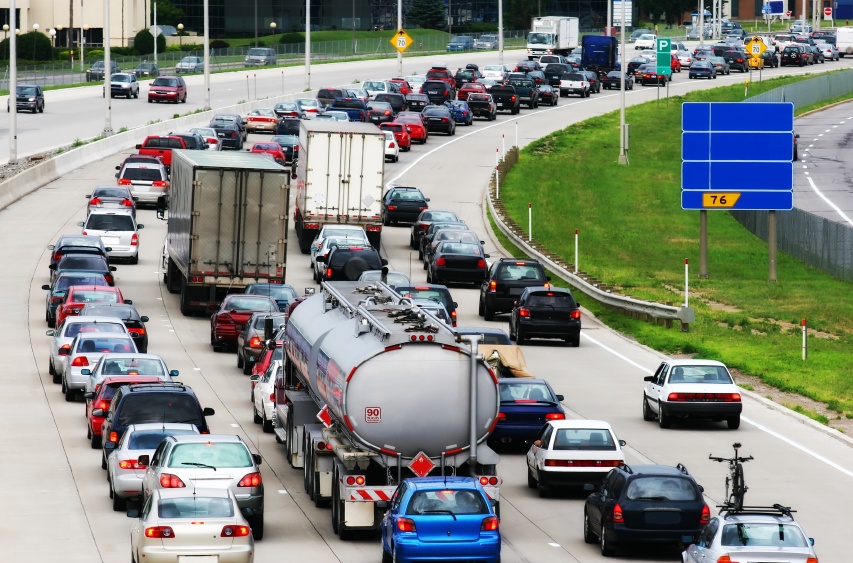 With 21 million people, the city of Lagos, Nigeria is one of the world’s busiest and fastest growing metropolitan areas.
With 21 million people, the city of Lagos, Nigeria is one of the world’s busiest and fastest growing metropolitan areas.
And with all those people comes a nightmarish amount of traffic. “The World’s Worst Traffic Jam,” The Atlantic Wrote in 2012. Things haven’t improved since then.
Reuters profiled Lagos’ traffic congestion in December of last year, describing commuters taking three hours to make a seven mile trip to work.
“The type of suffering we meet on the road is terrible,” bus driver Ossy Okafor told Ulf Laessing, Reuters’ bureau chief in Nigeria.
Anyone who’s ever been stuck in traffic can tell you about the psychological toll the experience can take. But there’s a financial cost as well. Traffic congestion costs Americans $1 trillion a year, according to the U.S. Department of Transportation.
Road congestion costs the trucking industry $27 billion a year due to lost time and extra fuel needs, the DOT said in its National Freight Strategic Plan.
There’s No ‘Best Way’
According to the report, traffic jams regularly impacted 10 percent of the 161,000-mile national highway system. By 2034, that figure is expected to jump to 34 percent, assuming nothing is done to fix the problem.
The report found that 8,700 miles of the highway system see stop-and-go conditions, while another 13,500 regularly slow below posted speed limits. The DOT called for more information technologies and great intermodal connectivity to deal with congestion.
A study by the American Transportation Research Institute in 2014 found that delays added up to 141 hours of lost productivity, the equivalent of 51,000 truck drivers staying idle for a working year.
ATRI’s study also looked at the average impact of traffic congestion on a per-truck level. A truck driven for 12,000 miles would lose $408 to congestion, while a truck that traveled 150,000 miles would have a congestion cost of close to $5,100.
Another study – the Texas A&M Transportation Institute’s Urban Mobility Report – also arrived at the $27 billion figure for the trucking industry.
It found that the Washington D.C. region had the nation’s worst congestion, followed by Los Angeles, San Francisco-Oakland, New York-Newark, Boston, Houston, Atlanta, Chicago, Philadelphia and Seattle.
“The most effective congestion reduction strategy is one where agency actions are complemented by efforts of business, manufacturers, commuters and travelers,” the Texas A&M report said. “There is no rigid prescription for the ‘best way’ – each region must identify the projects, programs and policies that achieve goals, solve problems and capitalize on opportunities.”
Finding Fuel Savings
If you’re a fleet manager, these are the issues you live with every day. By working with Sokolis, fleet managers gain a partner who’s focused solely on lowering your fuel costs.
Since 2003, we’ve brought our customers savings on more than 300 million gallons of fuel a year, achieving savings of more than $500 million. Our clients range from national Fortune 500 companies to local trucking firms.
Sokolis’ team of fuel management experts can help you:
- Guide drivers to the nearest discounted locations to maximize savings without adding out-of-route miles.
- Negotiate with fuel dealers for the best deals, while also auditing your pricing to make sure the deals you’ve made are honored.
- Identify the best way to purchase fuel; whether it is bulk, mobile, leasing company or, retail over-the-road.
- Determine whether a fuel card program is right for you.
Contact us today to learn more about how Sokolis can help your fleet find savings. And be sure to download our guide to emergency preparedness. It will give you advice on how to leverage your network to get service when disasters strike, and teach you how to respond when something threatens to tie up your fleet.
{{cta(‘1b8a7c8d-6e85-4f74-8f78-7be8d5889262’)}}